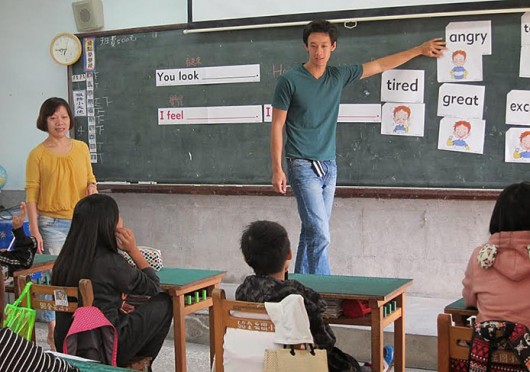
OSU graduate Adam Kong teaches English in Taiwan as a Fulbright Scholar. Kong also recently won a fellowship from the Charles B. Rangel International Affairs Program.
Credit: Courtesy of Adam Kong
Ohio State graduate Adam Kong might be preparing to become a U.S. diplomat in two years, but his daily commute hasn’t gotten any simpler.
“I drive my motorcycle to the train station, get on the train and go south for a half hour, then I used to do a 5K bike ride to my school. Then my bike broke so I had to hitchhike to work. So when I got sick of hitchhiking to work, someone took pity on me and let me borrow a scooter, so now I ride a 100cc scooter (to work),” Kong said in a Skype interview.
Kong, a 2013 Ohio State alumnus who studied Chinese and international studies with specializations in world economy and business and East Asian studies, has come a long way from his hometown of Cincinnati — in fact, more than 7,000 miles — as he is currently teaching English in Taiwan as a Fulbright Scholar.
But soon, he could be moving. Kong recently won a fellowship from the Charles B. Rangel International Affairs Program.
The Washington, D.C.-based Rangel program, which is affiliated with Howard University, gives 20 scholarships each year for college graduates and seniors who want to pursue a graduate school education and serve a post as a diplomat in the U.S. Foreign Service, a division of the State Department.
Since the program started in 2002, 10 students who attended Big Ten schools for their undergraduate education have been selected, including OSU, Michigan State, Indiana, Minnesota, Nebraska, Penn State, Purdue and Wisconsin, according to the Rangel fellows website.
Kong is the first OSU graduate to win the award, according to the website.
“There’s a lot of pride. It’s good for the individual, good for the (international studies) program and good for the university,” said Anthony Mughan, director of international studies at OSU.
Kong started out as a business major in the Fisher College of Business, but said he soon discovered it wasn’t for him.
“The more and more I got involved with Fisher, the less I realized I wanted to work for a corporation or any kind of money making organization. I began to explore my other options, working at nonprofits or NGOs, and making more of an impact on society. I guess, being the idealist I am, I wanted to find my career and personal goals and how they could go together,” Kong said.
An NGO is a nongovernmental organization, which is a nonprofit, voluntary group.
Kong is set to pursue a master’s degree in international affairs, with specializations in social and urban development, at Columbia University in the fall. As part of his Rangel fellowship, he will spend one summer interning in Congress and one summer abroad in a diplomatic post, followed by employment in the U.S. Department of State’s Foreign Service, a government public service organization that works around the world.
Although all Rangel fellows become diplomats in the Foreign Service, their day-to-day jobs once there can vary, said Patricia Scroggs, director of the Rangel International Affairs Program.
“They serve as Foreign Service Officers working in U.S. embassies and missions around the world and in Washington, D.C. They strengthen U.S.-Colombian cultures ties in Bogota, analyze and report on political development in New Delhi, manage embassies in Lome, advance human rights in Sarajevo and promote strong trade ties in Bangkok, just to give you a few examples,” Scroggs said in an email.
Although Kong currently works in Taiwan and studied East Asian studies, he could end up anywhere when he starts working for the U.S. Department of State, Scroggs said.
“We have fellows serving all over the world. At the moment, we have the largest numbers serving in China, Mexico and Brazil,” Scroggs said.
Kong, too, said while he’d like to stay in Asia, he won’t get his pick.
“Right now, I would be leaning toward somewhere in Asia or Southeast Asia, but the requirement is that you need to be available around the world. It doesn’t matter what your preference is. If (Secretary of State) John Kerry wants more people to go to Uganda, it’s about diplomatic experience, not language ability,” Kong said.


